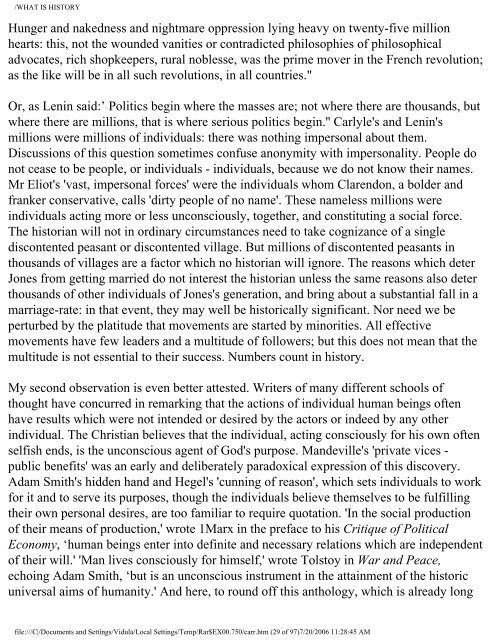What is History / by Edward Hallett Carr - Universal History Library
What is History / by Edward Hallett Carr - Universal History Library
What is History / by Edward Hallett Carr - Universal History Library
You also want an ePaper? Increase the reach of your titles
YUMPU automatically turns print PDFs into web optimized ePapers that Google loves.
WHAT IS HISTORY<br />
Hunger and nakedness and nightmare oppression lying heavy on twenty-five million<br />
hearts: th<strong>is</strong>, not the wounded vanities or contradicted philosophies of philosophical<br />
advocates, rich shopkeepers, rural noblesse, was the prime mover in the French revolution;<br />
as the like will be in all such revolutions, in all countries."<br />
Or, as Lenin said:’ Politics begin where the masses are; not where there are thousands, but<br />
where there are millions, that <strong>is</strong> where serious politics begin.'' Carlyle's and Lenin's<br />
millions were millions of individuals: there was nothing impersonal about them.<br />
D<strong>is</strong>cussions of th<strong>is</strong> question sometimes confuse anonymity with impersonality. People do<br />
not cease to be people, or individuals - individuals, because we do not know their names.<br />
Mr Eliot's 'vast, impersonal forces' were the individuals whom Clarendon, a bolder and<br />
franker conservative, calls 'dirty people of no name'. These nameless millions were<br />
individuals acting more or less unconsciously, together, and constituting a social force.<br />
The h<strong>is</strong>torian will not in ordinary circumstances need to take cognizance of a single<br />
d<strong>is</strong>contented peasant or d<strong>is</strong>contented village. But millions of d<strong>is</strong>contented peasants in<br />
thousands of villages are a factor which no h<strong>is</strong>torian will ignore. The reasons which deter<br />
Jones from getting married do not interest the h<strong>is</strong>torian unless the same reasons also deter<br />
thousands of other individuals of Jones's generation, and bring about a substantial fall in a<br />
marriage-rate: in that event, they may well be h<strong>is</strong>torically significant. Nor need we be<br />
perturbed <strong>by</strong> the platitude that movements are started <strong>by</strong> minorities. All effective<br />
movements have few leaders and a multitude of followers; but th<strong>is</strong> does not mean that the<br />
multitude <strong>is</strong> not essential to their success. Numbers count in h<strong>is</strong>tory.<br />
My second observation <strong>is</strong> even better attested. Writers of many different schools of<br />
thought have concurred in remarking that the actions of individual human beings often<br />
have results which were not intended or desired <strong>by</strong> the actors or indeed <strong>by</strong> any other<br />
individual. The Chr<strong>is</strong>tian believes that the individual, acting consciously for h<strong>is</strong> own often<br />
self<strong>is</strong>h ends, <strong>is</strong> the unconscious agent of God's purpose. Mandeville's 'private vices -<br />
public benefits' was an early and deliberately paradoxical expression of th<strong>is</strong> d<strong>is</strong>covery.<br />
Adam Smith's hidden hand and Hegel's 'cunning of reason', which sets individuals to work<br />
for it and to serve its purposes, though the individuals believe themselves to be fulfilling<br />
their own personal desires, are too familiar to require quotation. 'In the social production<br />
of their means of production,' wrote 1Marx in the preface to h<strong>is</strong> Critique of Political<br />
Economy, ‘human beings enter into definite and necessary relations which are independent<br />
of their will.' 'Man lives consciously for himself,' wrote Tolstoy in War and Peace,<br />
echoing Adam Smith, ‘but <strong>is</strong> an unconscious instrument in the attainment of the h<strong>is</strong>toric<br />
universal aims of humanity.' And here, to round off th<strong>is</strong> anthology, which <strong>is</strong> already long<br />
file:///C|/Documents and Settings/Vidula/Local Settings/Temp/Rar$EX00.750/carr.htm (29 of 97)7/20/2006 11:28:45 AM







